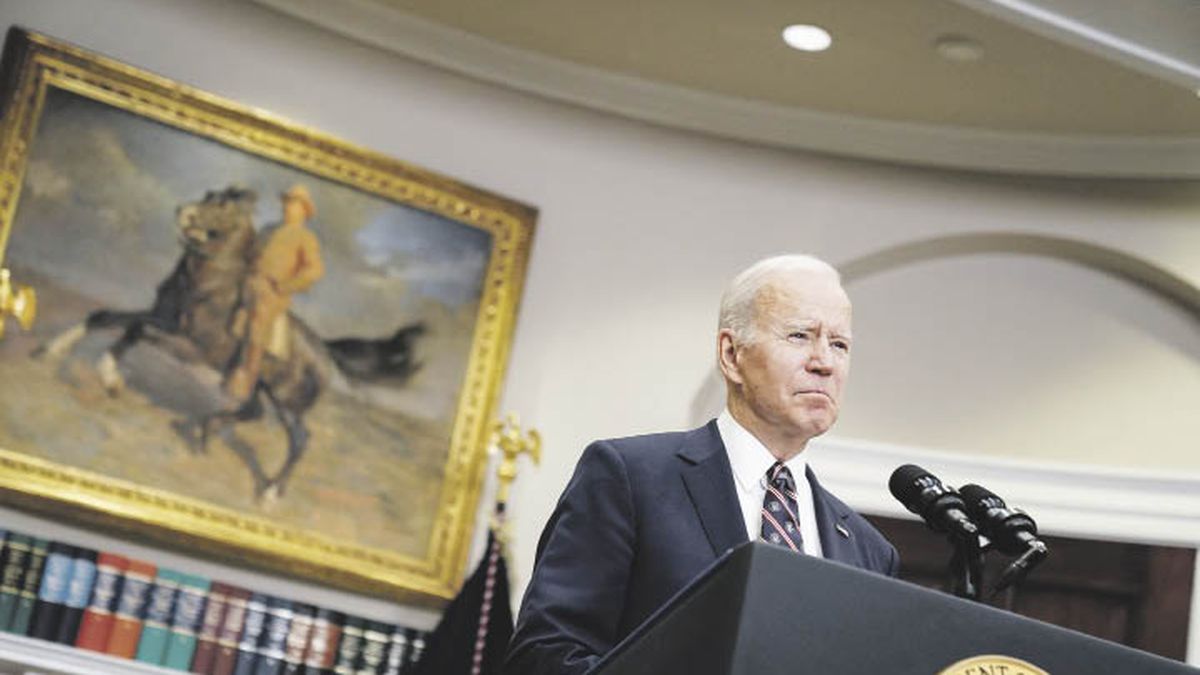The beginning of the withdrawal of Russian forces concentrated for several months on the Ukrainian borders, announced earlier by Moscow, “would be positive,” Biden said in a brief speech from the White House.
But the United States “has not yet verified for now” its implementation, he said.
These troops, which he estimated at “more than 150,000”, above the 100,000 mentioned so far by the Americans, remain in “a threatening position” around Ukraine, on the Russian side or in Belarus, Biden lamented.
“The United States is prepared whatever happens. We are ready with diplomacy,” he said.
“And we are ready to decisively respond to the Russian attack on Ukraine, which is still a big possibility,” he warned.
Earlier, the Russian Defense Ministry said some soldiers and equipment would leave the border region to return to their bases at the end of planned exercises.
the Russian president, Vladimir Putin confirmed the “partial withdrawal of troops”assuring on Tuesday that “of course” Russia does not want war and that it is willing to seek solutions with Western countries.
“We are ready to continue working together. We are ready to embark on the path of negotiations,” Putin said at a joint news conference with German Chancellor Olaf Scholz after a meeting in Moscow.
Scholz hailed the announcement of this partial withdrawal as “a good sign”, and considered that “there are sufficient bases for discussion” with Russia “for things to evolve positively”.
The French President, Emmanuel Macron also described this as the “first positive sign” during a telephone conversation with Biden, while agreeing with Biden on the need to “verify” this start of withdrawal, according to Paris.
On his side, the Secretary of State of the United States, Antony Blinken, also asked his Russian counterpart, Sergei Lavrov, for a “verifiable, credible and significant de-escalation” during a telephone conversation on Tuesday.
Russia, on the other hand, continues major maneuvers in Belarus, Ukraine’s pro-Russian neighbor, until February 20.
Putin reiterated that the expansion of NATO and Ukraine’s aspiration to join the alliance constitute a threat to Russia.
“There is a fact: Ukraine’s entry into NATO is not on the agenda,” the German Scholz replied, however. “Everyone has to step back and realize that we cannot have a military conflict over an issue that is not on the agenda,” he stressed.
The United States, which continues to wield the specter of a Russian invasion of Ukraine that could happen “at any time”, kept up the pressure on the rival power.
Western sanctions against Russia in the event of a military offensive “are ready”, Biden warned, promising a “decisive” response.
These “powerful” punitive measures will put “pressure on its largest and most important financial institutions and key industries,” the US president said. He also reaffirmed that the controversial Nord Stream 2 gas pipeline between Russia and Germany would never come online in the event of a Russian attack.
Biden also announced that he is “ready to respond” to any “asymmetric attack” against the United States or its NATO allies, including cyber attacks in particular.
But the president, who spoke directly with Putin on Saturday, he pointed out that there were “real ways” to address the security concerns of both sides.
“Diplomacy must be given every opportunity,” he said.
For his part, Lavrov called his counterpart Blinken to a “pragmatic dialogue” while denouncing the “aggressive rhetoric used by Washington.”
Moscow, which denies wanting to invade Ukraine, deplores the Western countries’ rejection of its main demands: the end of the Alliance’s enlargement policy, the commitment not to deploy weapons offensives near Russian territory and the withdrawal of the infrastructure of the Eastern European NATO.
For Putin, these issues and his demands must be part of the same “package” of negotiations.
A computer attack targeting Ukrainian strategic infrastructure works to perturb the authorities is one of the scenarios mentioned as harbingers of a classic military offensive.
At the same time, the Russian Parliament called on President Putin to recognize the independence of breakaway territories in eastern Ukraine.
“This recognition would be a clear violation of the Minsk agreements”, signed under Franco-German mediation and which provide for the eventual return of these territories to the control of Kiev, the head of European diplomacy, Josep Borrell, immediately warned.
Source: Ambito
David William is a talented author who has made a name for himself in the world of writing. He is a professional author who writes on a wide range of topics, from general interest to opinion news. David is currently working as a writer at 24 hours worlds where he brings his unique perspective and in-depth research to his articles, making them both informative and engaging.




